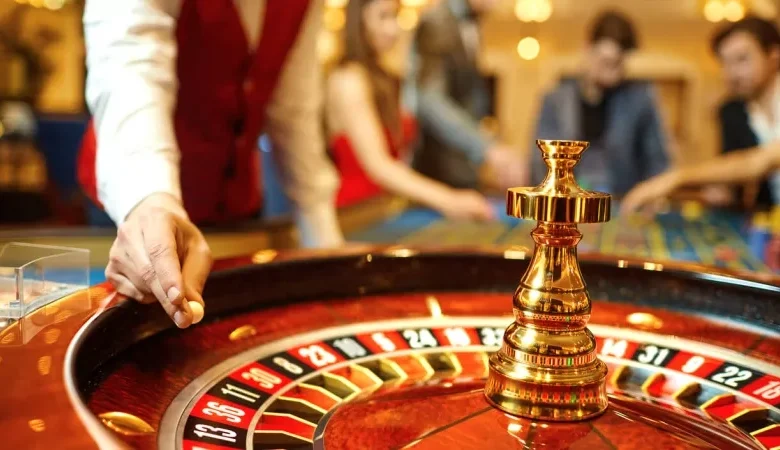Introduction: The Casino Experience Like No Other

Casinos have long been centers of entertainment, excitement, and luxury. Whether it’s the flashing lights of Las Vegas or the sophisticated elegance of Monte Carlo, the world of casinos offers something unique to every visitor. From classic games like blackjack and roulette to the clinking sounds of slot machines, casinos have a vibe that is unmatched by any other form of entertainment.
Stepping into a casino is like entering another world. It’s a place where time seems to pause, distractions disappear, and adrenaline kicks in. The combination of sensory stimulation, psychological tension, and the possibility of hitting the jackpot creates an addictive atmosphere that many find irresistible. The allure isn’t just about winning money—it’s about the entire experience.
And let’s not forget the social aspect. Casinos are social melting pots. People from all walks of life—business executives, tourists, retirees, and thrill-seekers—gather under one roof with a common goal: to have fun and test their luck. Whether you win or lose, the experience itself often becomes the most memorable part.
The History of Casinos: From Ancient Dice Games to Modern Resorts
The concept of gambling is far from new. In fact, it dates back thousands of years. Ancient Chinese, Greek, and Roman civilizations had forms of gambling that were integral to their cultures. Some historians even suggest that the roots of modern casinos trace back to 2300 B.C., where dice-like games were found in archaeological sites.
Fast forward to 17th-century Italy, and we see the birth of the first known gambling house, Ridotto, in Venice. Established in 1638, this venue was designed to provide a controlled gambling environment during the carnival season. From there, the idea of designated gambling spaces began to spread across Europe, evolving over time into today’s casino culture.
The rise of Las Vegas in the 20th century marked a turning point. It became the epicenter of gambling and entertainment. Casinos were no longer just places to gamble—they became destinations complete with hotels, restaurants, theaters, and shopping. Today, casinos are found worldwide, from Macau to Monaco, each with their own unique flair and flavor.
Types of Casino Games: From Slots to Strategy

Walk into any casino, and you’ll be greeted by an overwhelming variety of games. Some are based purely on chance, while others involve strategy and skill. Understanding the different types of games can help players decide what suits them best.
Slot Machines: These are the most iconic casino games. Easy to play and full of flashing lights and catchy sound effects, slots require no skill—just pull the lever (or press the button) and hope for the best. With themes ranging from ancient Egypt to pop culture, slot machines cater to every taste.
Table Games: Games like blackjack, poker, and baccarat require more interaction and, in some cases, strategic thinking. Blackjack, for example, is one of the few games where skill and strategy can influence the outcome. Poker, especially in tournament settings, combines mathematics, psychology, and bluffing to create a deeply engaging experience.
Roulette and Craps: These are more chance-based, but still involve exciting gameplay. In roulette, players place bets on numbers, colors, or sections of a spinning wheel. Craps is a dice game full of energy, often with groups of people cheering each other on. These games are great for players who enjoy quick action and communal excitement.
The Psychology Behind Gambling: Why We Keep Coming Back
Ever wonder why gambling can be so addictive? It’s not just the chance of winning big—it’s the psychological effects involved. Casinos are expertly designed to create a sense of urgency, excitement, and reward that keeps people playing.
One of the key elements is the “near-miss effect.” When a player almost wins—say, two out of three matching slot symbols—it creates a powerful sense of anticipation. This near-win can trigger dopamine release in the brain, the same chemical associated with pleasure and reward. The brain interprets this as a success, even though no money was won, encouraging players to try again.
Then there’s the illusion of control. In games like poker or blackjack, players feel they can influence the outcome, which leads to increased confidence. Even in games of pure chance, people often develop rituals or “lucky charms,” believing they can change the odds in their favor.
Casinos also create environments where time and external distractions disappear. No clocks, no windows, ambient lighting, and constant noise—all designed to make players lose track of time and stay longer. Combine this with the possibility of winning money, and it’s easy to see how the allure of gambling becomes so strong.
The Modern Casino Industry: More Than Just Gambling
Today’s casinos are not just about card games and spinning reels. They are full-blown resorts offering luxury hotels, gourmet dining, live shows, shopping, and spas. The goal is to create a complete experience where guests can relax, be entertained, and indulge.
Take Las Vegas, for example. The Strip is home to some of the most extravagant casino resorts in the world. The Bellagio, with its iconic fountains, offers art galleries, high-end boutiques, and world-class cuisine. The Venetian recreates the magic of Venice with gondola rides and intricate architecture. Each casino tries to outdo the others in luxury and spectacle.
Even online casinos have entered the game. With the rise of the internet and mobile devices, people can now enjoy their favorite casino games from home. Live dealer games, virtual slots, and poker tournaments are available at the click of a button. The convenience and accessibility of online casinos have significantly expanded the reach of the gambling industry.
Casinos are also major economic contributors. They create jobs, attract tourism, and generate tax revenue for governments. In cities like Macau, Las Vegas, and Atlantic City, the casino industry is a major economic engine driving growth and development.
Responsible Gambling: Knowing When to Walk Away
With all the fun and excitement, it’s easy to get carried away. That’s why responsible gambling is an important topic that every player should take seriously. Gambling should always be viewed as entertainment—not a way to make money or solve financial problems.
One key tip is to set a budget before entering a casino or logging onto an online gambling site. Decide how much money you’re willing to lose and stick to it. Treat it the same way you would budget for a night out at a concert or dinner.
Time management is also crucial. Casinos are designed to make you lose track of time, so it’s wise to set a timer or schedule breaks. Taking regular breaks can help clear your mind and keep you from making impulsive decisions.
Lastly, recognize the warning signs of problem gambling. If gambling stops being fun, causes stress, or affects your finances or relationships, it’s time to seek help. Many casinos now offer self-exclusion programs, counseling services, and hotlines to support responsible play. The goal is to enjoy the experience without falling into unhealthy patterns.
Conclusion: The Casino’s Enduring Allure
Casinos continue to captivate people around the globe. Whether you’re drawn by the thrill of the game, the glamor of the surroundings, or simply the desire for a unique night out, there’s no denying the universal appeal of these iconic venues. They’ve evolved from simple gambling houses into complex entertainment ecosystems that cater to every kind of visitor.
But while casinos promise excitement and the potential for rewards, the key is to enjoy them responsibly. At their best, they are thrilling, social, and full of unforgettable experiences. With the right mindset and awareness, a trip to the casino—whether in person or online—can be a fantastic part of your entertainment repertoire.
So the next time you step into a casino, remember: it’s not just about the win. It’s about the energy, the atmosphere, and the adventure.



